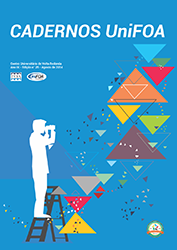ORGANIZATIONAL CLIMATE AND CULTURE IN PUBLIC UNIVERSITIES: AN INTEGRATIVE LITERATURE REVIEW
uma revisão integrativa da literatura
DOI:
https://doi.org/10.47385/cadunifoa.v19.n54.5237Keywords:
Cultura Organizacional, Clima Organizacional, Universidades Públicas, Revisão IntegrativaAbstract
Positive organizational culture and climate are fundamental to knowledge management and innovation in public universities, as they encourage the search for creative solutions, collaboration and the exchange of ideas. Despite their relevance to institutional dynamics, there is still a lack of studies investigating their impact. In this context, the aim of this article is to map scientific production on organizational climate and culture in the academic and administrative environment of public universities. To this end, an integrative literature review was carried out. The research analyzed 37 articles from different countries published up to 2023 in the Web of Science database. The results showed that academic culture is characterized by valuing autonomy, academic freedom, research and teaching, directly impacting the performance and well-being of community members. The study highlighted the influence of organizational culture on the effectiveness of educational institutions, promoting educational innovation, knowledge management and information sharing. The relationship between organizational climate and culture was also explored, with studies highlighting the importance of understanding how employees perceive and experience the work environment. Finally, the research points out challenges and limitations provided in scientific production, such as the lack of generalization of results and the diversity of methodologies, reinforcing the need for more robust and comparative studies.
Downloads
References
AL ISSA, H.-E. Organisational Culture in Public Universities: Empirical Evidence. Asian Journal of Business and Accounting, v. 12, n. 1, p. 41–70, 27 jun. 2019. DOI: https://doi.org/10.22452/ajba.vol12no1.2
BAHAR, E. Örgüt Kültürü Analizi: Üniversite Stratejik Planlarına Yönelik Bir Araştırma (Organizational Culture Analysis: A Research on University Strategic Plans). Journal of Business Research - Turk, v. 12, n. 2, p. 2017–2030, 24 jun. 2020. DOI: https://doi.org/10.20491/isarder.2020.959
CERIBELI, H. B.; TEIXEIRA, F. C. A. Análise da relação entre clima organizacional e comportamento de cidadania organizacional. Revista da UNIFEBE, v. 1, n. 21, p. 69–85, 31 out. 2017.
DUTRA, Joel Souza. Administração de carreiras. São Paulo: Atlas, 1996.
IDDAGODA, A.; VOLKOVA, N. V.; BAGIEŃSKA, A. Evidence From Public Universities in Sri Lanka About Organizational Culture and Employee Engagement. IGI Global eBooks, p. 206–226, 24 jun. 2022. DOI: https://doi.org/10.4018/978-1-6684-5195-3.ch012
GEBRETSADIK, D. M. Impact of organizational culture on the effectiveness of public higher educational institutions in Ethiopia. International Journal of Leadership in Education, p. 1–20, 11 fev. 2020.
MAKUMBE, W. The impact of organizational culture on employee creativity amongst Zimbabwean academics. African Journal of Science, Technology, Innovation and Development, p. 1–9, 2 fev. 2021. DOI: https://doi.org/10.1080/20421338.2020.1864882
MENDES, K. D. S.; SILVEIRA, R. C. DE C. P.; GALVÃO, C. M. Revisão integrativa: método de pesquisa para a incorporação de evidências na saúde e na enfermagem. Texto & Contexto - Enfermagem, v. 17, n. 4, p. 758–764, dez. 2008. DOI: https://doi.org/10.1590/S0104-07072008000400018
PADRÃO, L. C.; RODRIGUES, R. L. Transferência de tecnologia universidade-empresa no Brasil (1994-2020): uma análise da literatura. Perspectivas em Gestão & Conhecimento, [S. l.], v. 12, n. 2, p. 189–208, 2022. Disponível em: https://periodicos.ufpb.br/index.php/pgc/article/view/59357. Acesso em: 23 jun. 2024.
PAULA, P. D. et al. Clima e Cultura Organizacional em uma Organização Pública. Gestão & Regionalidade, v. 27, n. 81, set-dez/2011. DOI: https://doi.org/10.13037/gr.vol27n81.1279
SOUZA, M. T. DE; SILVA, M. D. DA; CARVALHO, R. DE. Integrative Review: What Is It? How to Do It? Einstein (São Paulo), v. 8, n. 1, p. 102–106, mar. 2010. DOI: https://doi.org/10.1590/s1679-45082010rw1134
TANG, Y. W.; ONG, T. S.; Muhamad, H. B. Organizational cultures, budget participation and performance: an empirical study of Chinese public universities. CEMJP, v. 31, n. 2, p. 84-93, 2023. DOI: 10.57030/23364890.cemj.31.2.10. Acesso em: 6 jun. 2024. DOI: https://doi.org/10.57030/23364890.cemj.31.2.10
Downloads
Published
How to Cite
Issue
Section
License
Copyright (c) 2024 Cadernos UniFOA

This work is licensed under a Creative Commons Attribution-NonCommercial-ShareAlike 4.0 International License.
Declaração de Transferência de Direitos Autorais - Cadernos UniFOA como autor(es) do artigo abaixo intitulado, declaro(amos) que em caso de aceitação do artigo por parte da Revista Cadernos UniFOA, concordo(amos) que os direitos autorais e ele referentes se tornarão propriedade exclusiva desta revista, vedada qualquer produção, total ou parcial, em qualquer outra parte ou meio de divulgação, impressa ou eletrônica, sem que a prévia e necessária autorização seja solicitada e, se obtida, farei(emos) constar o agradecimento à Revista Cadernos UniFOA, e os créditos correspondentes. Declaro(emos) também que este artigo é original na sua forma e conteúdo, não tendo sido publicado em outro periódico, completo ou em parte, e certifico(amos) que não se encontra sob análise em qualquer outro veículo de comunicação científica.
O AUTOR desde já está ciente e de acordo que:
- A obra não poderá ser comercializada e sua contribuição não gerará ônus para a FOA/UniFOA;
- A obra será disponibilizada em formato digital no sítio eletrônico do UniFOA para pesquisas e downloads de forma gratuita;
- Todo o conteúdo é de total responsabilidade dos autores na sua forma e originalidade;
- Todas as imagens utilizadas (fotos, ilustrações, vetores e etc.) devem possuir autorização para uso;
- Que a obra não se encontra sob a análise em qualquer outro veículo de comunicação científica, caso contrário o Autor deverá justificar a submissão à Editora da FOA, que analisará o pedido, podendo ser autorizado ou não.
O AUTOR está ciente e de acordo que tem por obrigação solicitar a autorização expressa dos coautores da obra/artigo, bem como dos professores orientadores antes da submissão do mesmo, se obrigando inclusive a mencioná-los no corpo da obra, sob pena de responder exclusivamente pelos danos causados.










